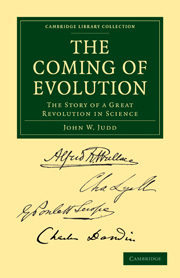Book contents
- Frontmatter
- Contents
- CHAP. I Introductory
- CHAP. II Origin of the Idea of Evolution
- CHAP. III The Development of the Idea of Evolution to the Inorganic World
- CHAP. IV The Triumph of Catastrophism over Evolution
- CHAP. V The Revolt Scrope and Lyell against Catastrophism
- CHAP. VI The Principles of Geology
- CHAP. VII The Influence of Lyell's Works
- CHAP. VIII Early Attempts to establish the Doctrine of Evolution for the Organic World
- CHAP. IX Darwin and Wallace: The Theory of Natural Selection
- CHAP. X The Origin of Species
- CHAP. XI The Influence of Drawin's Works
- CHAP. XII The Place of Lyell and Darwin in History
- Notes
- Index
- Plate section
CHAP. I - Introductory
Published online by Cambridge University Press: 07 September 2010
- Frontmatter
- Contents
- CHAP. I Introductory
- CHAP. II Origin of the Idea of Evolution
- CHAP. III The Development of the Idea of Evolution to the Inorganic World
- CHAP. IV The Triumph of Catastrophism over Evolution
- CHAP. V The Revolt Scrope and Lyell against Catastrophism
- CHAP. VI The Principles of Geology
- CHAP. VII The Influence of Lyell's Works
- CHAP. VIII Early Attempts to establish the Doctrine of Evolution for the Organic World
- CHAP. IX Darwin and Wallace: The Theory of Natural Selection
- CHAP. X The Origin of Species
- CHAP. XI The Influence of Drawin's Works
- CHAP. XII The Place of Lyell and Darwin in History
- Notes
- Index
- Plate section
Summary
When the history of the Nineteenth Century—‘ the Wonderful Century,’ as it has, not inaptly, been called—comes to be written, a foremost place must be assigned to that great movement by which evolution has become the dominant factor in scientific progress, while its influence has been felt in every sphere of human speculation and effort. At the beginning of the Century, the few who ventured to entertain evolutionary ideas were regarded by their scientific contemporaries, as wild visionaries or harmless ‘cranks’—by the world at large, as ignorant ‘quacks’ or ‘designing atheists.’ At the end of the Century, evolution had not only become the guiding principle of naturalists, but had profoundly influenced every branch of physical science ; at the same time, suggesting new trains of thought and permeating the language of philologists, historians, sociologists, politicians—and even of theologians.
How has this revolution in thought—the greatest which has occurred in modern times—been brought about? What manner of men were they who were the leaders in this great movement? What the influences that led them to discard the old views and adopt new ones? And, under what circumstances were they able to produce the works which so profoundly affected the opinions of the day? These are the questions with which I propose to deal in the following pages.
- Type
- Chapter
- Information
- The Coming of EvolutionThe Story of a Great Revolution in Science, pp. 1 - 4Publisher: Cambridge University PressPrint publication year: 2009First published in: 1910



